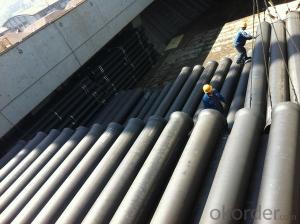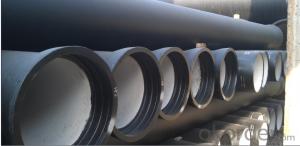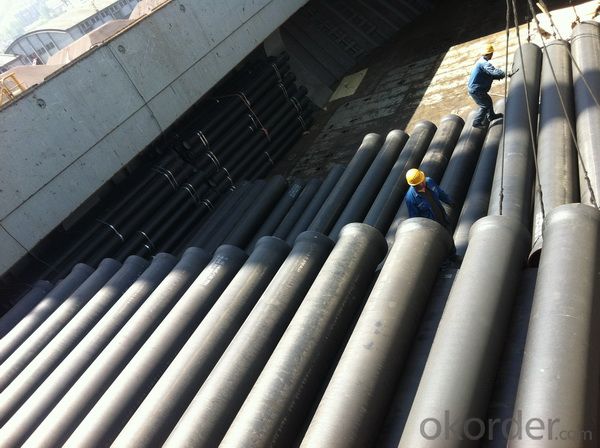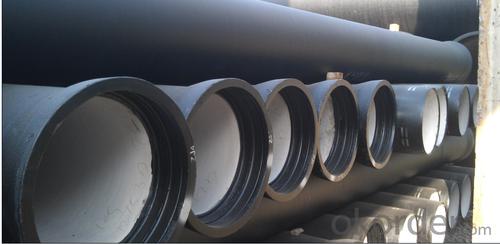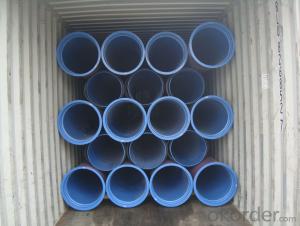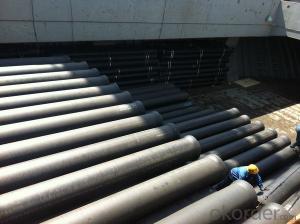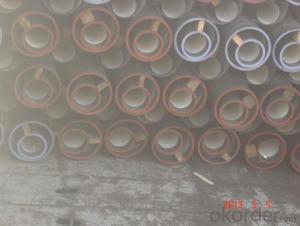T Type Ductile Iron Pipe DN400 Socket spigot pipe
- Loading Port:
- Tianjin
- Payment Terms:
- TT OR LC
- Min Order Qty:
- 200 m.t
- Supply Capability:
- 30000 m.t/month
OKorder Service Pledge
OKorder Financial Service
You Might Also Like
1) The standard of pipe: ISO2531:1998, EN545:2006,K9 K8
2) Effective length: 6m/5.7m
3) Inner cement line: Portland cement lineas per ISO4179
4) Zinc coating: at least 130g/m2 as per ISO8179
5) Bitumen painting: at least 70μm as per ISO8179
6)With 102% quantity of NBR, SBR, or EPDM ring asper ISO4633
7) DN80-DN1200
8) Highstrength, lighter than grey iron, good corrosion resistance, no furring, smallflow resistance, easy fixing, long life tome about 100 yeas
9)Checked by automatic inspection equipment
10) Composition:
Chemical composition | |||
Chemical composition | Ductile Cast Iron Pipe (%) | Grey iron pipe (%) | Steel pipe (%) |
C | 3.5-4.0 | 3.2-3.8 | 0.1-0.2 |
Si | 1.9-2.6 | 1.4-2.2 | 0.15-0.4 |
Mn | 0.15-0.45 | 0.4-0.6 | 0.3-0.6 |
P | ≤0.06 | ≤0.3 | 0.02-0.03 |
S | ≤0.02 | ≤0.1 | 0.02-0.03 |
Mg | 0.03-0.06 |
|
|
11) Feature:
Mechanical properties | |||
| Ductile Cast Iron Pipe | Grey Iron Pipe | Steel Pipe |
Tensile Strength(Mpa) | ≥420 | 150-260 | ≥400 |
Yield Strength(Mpa) | ≥300 | No Confirmation | No Confirmation |
Bending Strength(Mpa) | ≥590 | 200-360 | ≥400 |
Elongation (%) | ≥10 | Neglected | ≥18 |
Brinell Hardness(HBS) | ≤230 | ≤230 | About 140 |
12) T type mechanical joint
13) Packing: in bulk or container
PACKING: 1) Pipesare bundled together with the steel belt.
2) Wooden pieces are put between the pipes.
- Q: Are ductile iron pipes suitable for installation in areas with high groundwater salinity?
- Areas with high groundwater salinity are generally suitable for the installation of ductile iron pipes. Ductile iron is renowned for its resistance to corrosion, making it a favored choice for various applications, such as water and wastewater systems. High groundwater salinity refers to the increased presence of dissolved salts in the water. Although this can potentially cause corrosion in certain materials, ductile iron pipes are specifically engineered to withstand such conditions. These pipes are equipped with a protective lining, usually composed of cement mortar or polyurethane, which acts as a barrier between the pipe and its surroundings, including highly saline water. The lining serves to prevent any corrosive effects of the high groundwater salinity on the iron pipe, ensuring its long-lasting durability and reliability. Furthermore, ductile iron pipes possess a high tensile strength, enabling them to endure external loads and pressure, even in demanding environments. It is important to acknowledge that the suitability of ductile iron pipes for areas with high groundwater salinity can also be influenced by factors such as the specific levels of salinity, the presence of other corrosive agents, and the overall design and installation practices. Therefore, it is advisable to consult experts or engineers who are familiar with the local conditions in order to determine the most appropriate materials and precautions for specific installation projects.
- Q: Can ductile iron pipes be used in areas with high levels of organic matter in soil?
- Yes, ductile iron pipes can be used in areas with high levels of organic matter in soil. Ductile iron pipes are known for their durability and strength, making them suitable for various soil conditions, including those with high levels of organic matter. The pipes are resistant to corrosion and can withstand the chemical reactions that occur in organic-rich soils. Additionally, ductile iron pipes have a smooth interior surface, which reduces the likelihood of organic matter buildup and clogging. However, it is important to consider the specific conditions of the soil and consult with engineers or experts to ensure proper installation and maintenance practices are followed.
- Q: How do ductile iron pipes handle dynamic loads?
- Ductile iron pipes are known for their exceptional strength and durability, which allows them to effectively handle dynamic loads. These pipes have a high resistance to bending and can withstand the pressure and stress exerted on them when subjected to dynamic loads, such as water hammer or ground movement. The unique composition of ductile iron, which includes a small amount of carbon and the addition of magnesium, creates a structure that is both strong and flexible. This combination enables the pipes to flex under the impact of dynamic loads, rather than fracturing or breaking like other materials. Additionally, ductile iron pipes have a high impact resistance, which means they can absorb and distribute the energy generated by dynamic loads throughout their structure. This ability to dissipate energy helps to minimize the risk of pipe failure and ensures the longevity of the pipeline system. Furthermore, ductile iron pipes have excellent stress distribution properties, which means that the load applied to the pipes is evenly dispersed along their length. This helps to prevent localized stress concentrations and reduces the likelihood of damage or failure. In summary, ductile iron pipes are designed to handle dynamic loads efficiently. Their strength, flexibility, impact resistance, and stress distribution properties make them highly suitable for applications where dynamic loads are a concern, ensuring the reliability and longevity of the pipeline system.
- Q: What is ductile iron pipe?
- The main components of ductile iron pipes are carbon, silicon, manganese, sulfur, phosphorus and magnesium. Execution standard GB/T13295-2003ISO2531/2003
- Q: Can ductile iron pipes be used for underground storage tanks?
- Under specific circumstances, ductile iron pipes are appropriate for underground storage tanks. This material possesses strength and durability, effectively resisting corrosion and making it a suitable option for underground applications. Nevertheless, several factors must be taken into account before implementing ductile iron pipes for underground storage tanks. First and foremost, it is vital to evaluate the project's precise demands and regulations. Different regions and industries may enforce specific guidelines regarding the materials used in underground storage tanks. It is imperative to ascertain that ductile iron pipes comply with these regulations and meet the required standards for underground storage. Secondly, the size and capacity of the storage tank must be considered. Ductile iron pipes are available in various sizes, but their dimensions may not be suitable for large-scale storage tanks due to limitations. Consulting engineers or experts is necessary to determine the appropriate pipe size and capacity for the specific storage requirements. Lastly, the design and installation of the underground storage tank necessitate careful planning. Adequate measures should be taken to seal and protect against external factors such as soil movements, water pressure, or other potential hazards. Preventive actions should be implemented to avoid leaks or damage to the pipes, ensuring the safety and longevity of the storage tank. In conclusion, ductile iron pipes can be utilized for underground storage tanks, but it is crucial to consider the specific requirements, regulations, sizing limitations, and proper design and installation. Seeking guidance from professionals in the field and adhering to industry standards will ensure successful implementation of ductile iron pipes for underground storage tanks.
- Q: What is a slide in type T flexible interface?
- There are many kinds of cast iron pipe interface. The commonly used interfaces include sliding type (T type) flexible interface, mechanical type (K type) flexible interface, mechanical type (NII type, SII type) flexible interface, flange type interface and special interfaceSliding type (T type) flexible interfaceSlide type (T type) flexible interface as shown below. The ductile interface is widely used in the DN I000mm following the cast iron pipe, has the advantages of simple structure, convenient installation, good sealing characteristics. In the socket structure considering the location of the rubber ring and the deflection angle, this interface can adapt to deformation a certain foundation, has certain anti vibration ability, at the same time using the deflection angle of the long distance pipeline to achieve steering.
- Q: What do ductile iron pipes need to connect with three? Can I contact it directly?
- Old craft1. dozen to lead lead; cut into strips, with a file play in the interface2. use expanded cement with asbestos3 use the asphalt
- Q: Are ductile iron pipes suitable for wastewater pumping stations?
- Yes, ductile iron pipes are suitable for wastewater pumping stations. Ductile iron has high tensile strength, durability, and corrosion resistance, making it ideal for handling the abrasive and corrosive nature of wastewater. Additionally, ductile iron pipes have excellent pressure-bearing capabilities, ensuring reliable and efficient operation in wastewater pumping stations.
- Q: Can ductile iron pipes be used for underground water treatment systems?
- Yes, ductile iron pipes can be used for underground water treatment systems. Ductile iron is known for its strength and durability, making it a suitable choice for underground applications. Additionally, ductile iron pipes have excellent corrosion resistance, which is important for water treatment systems that may come into contact with various chemicals and contaminants.
- Q: Can ductile iron pipe be used in corrosive environments?
- Yes, ductile iron pipe can be used in corrosive environments. Ductile iron is known for its ability to resist corrosion and has been widely used in various applications where corrosion resistance is required. The corrosion resistance of ductile iron is due to its protective oxide layer, which forms naturally on its surface and acts as a barrier against corrosive elements. Additionally, ductile iron pipes can be coated with various protective coatings such as polyethylene or epoxy to enhance their resistance to corrosion. These coatings provide an extra layer of protection, making ductile iron pipes suitable for use in highly corrosive environments such as wastewater treatment plants, industrial plants, and marine applications. However, it is important to consider the specific corrosive elements present in the environment and consult with experts or follow industry standards to ensure the appropriate coating and maintenance practices are implemented for long-term performance and durability.
Send your message to us
T Type Ductile Iron Pipe DN400 Socket spigot pipe
- Loading Port:
- Tianjin
- Payment Terms:
- TT OR LC
- Min Order Qty:
- 200 m.t
- Supply Capability:
- 30000 m.t/month
OKorder Service Pledge
OKorder Financial Service
Similar products
Hot products
Hot Searches
Related keywords
